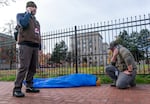A partnership between police and public health workers in downtown Portland aimed at connecting more people with drug treatment is getting government funding and an office space, state and local leaders announced Wednesday.

Portland Police Bureau’s bike squad members, including Portland Police Sgt. Jerry Cioeta, center, reflected in a downtown business window while awaiting transport for a man on a fentanyl-related charge on Feb. 7, 2024. The work is part of a pilot program by Portland Police Bureau’s bike squad and addiction recovery providers that launched in December 2023.
Kristyna Wentz-Graff / OPB
Starting in December, officers with the Portland Police Bureau’s bike squad and Oregon State Police began to work directly with treatment providers in the city’s Old Town neighborhood. The hope was to create a more immediate path for people who want drug treatment.
Under Ballot Measure 110, Oregon’s drug decriminalization law, police handed out $100 citations for drug use. In lieu of paying the fine, drug users could call a state-run hotline to get assessed for a substance use disorder. They had to make another call if they actually wanted to get treatment. But few did. The whole process proved unrealistic for people actively using substances such as fentanyl and methamphetamine.
Under the pilot program that started last year, police would still issue Measure 110 tickets, and offer an immediate opportunity to connect with a treatment provider. In one case OPB reported, a man named Joseph went from the street, immediately into detox, and stayed in treatment.
Police and treatment workers have connected with more than 150 people during the 10 days they’ve worked together, according to Devon Downeysmith, with the Health Justice Recovery Alliance, key supporters of Measure 110.

Outreach worker Ryan Hazlett, with Mental Health & Addiction Association of Oregon, and a representative from Recovery Works NW, right, make calls to find treatment options for a man sick from fentanyl, center, in downtown Portland, Ore. on Dec. 13, 2023. The work was part of a pilot program by Portland Police Bureau’s bike squad and addiction recovery providers that launched in December 2023.
Kristyna Wentz-Graff / OPB
The program will cost $683,000 during the first year, which will come from the city of Portland, Multnomah County and the state. The funding will cover a lease for office space at Mercy Corp, along with a vehicle and five staff members, including four outreach team members who work on the streets to directly connect with people who want to access treatment.
“Through this pilot program, [Mental Health & Addiction Association of Oregon] peer support outreach teams have been able to work collaboratively with law enforcement to connect individuals who are experiencing addiction and mental health issues to the available services they want and need,” Janie Gullickson, the nonprofit’s executive director, said in a statement. Gullickson said this could take the work to “the next level.”
Oregon lawmakers made sweeping changes to Measure 110 during their recent legislative session to add more funding for treatment while also re-criminalizing drugs. Gov. Tina Kotek signed House Bill 4002 this month, making drug possession a misdemeanor crime once more.
“This is a tangible result that has the potential to be a model for other regions,” Kotek said in a statement Wednesday.
